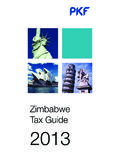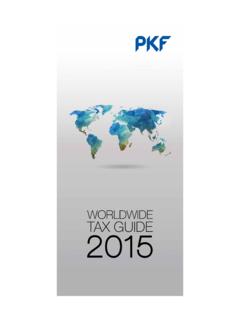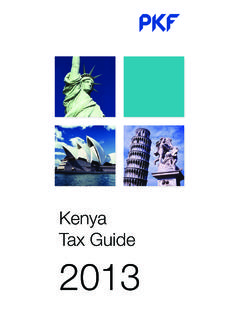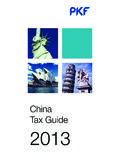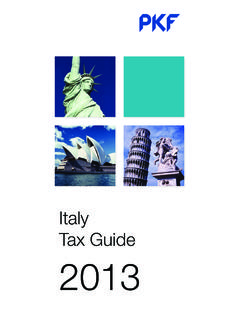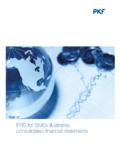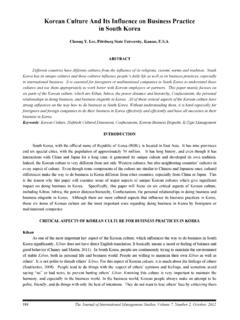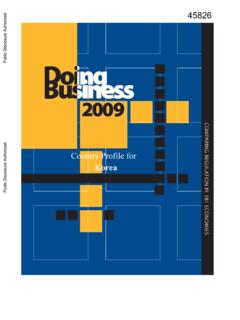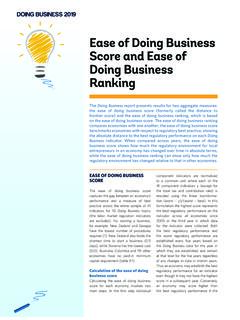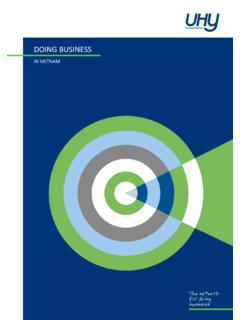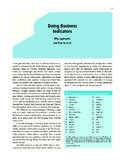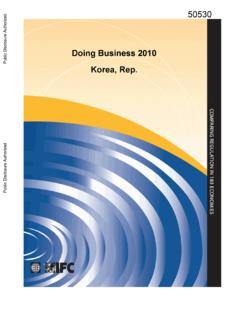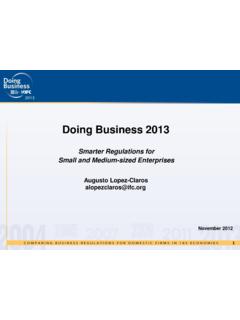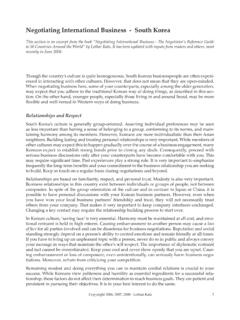Transcription of Doing business in Japan - PKF International
1 Doing business in Japan Important disclaimer No person should act or rely upon any matter on information contained in or implied in this publication without first obtaining advice from a qualified adviser that relates specifically to their particular circumstances. This publication should not be regarded as offering a complete explanation of the taxation matters referred to. The publishers and the authors are not responsible for the results either of any actions taken on the basis of information in this publication, nor for any error in or omission from this publication. The publishers and the authors expressly disclaim all and any liability and responsibility to any person, who acts or fails to act as a consequence of reliance upon the whole or any part of the contents of this publication. Nakamoto and Company is a member firm of the PKF International Limited network of legally independent firms and does not accept any responsibility or liability for the actions or inactions on the part of any other individual member firm or firms.
2 PKF - Doing business in Japan Contents i Geography and Populations 1 Introduction 1 Foreword Contents Constitution 1 Legal System 1 Communications 2 Language and Currency 2 Major Exports and Imports 2 Advantages of Investing in Japan 2 Programs and Support to Promote Investment into Japan 3 Import Control 3 Exchange Control 4 Source of Finance 4 business Structures 5 Types of business Structures 5 Representative Office 5 Branch Office 5 Subsidiary Company 6 Limited Liability Partnership (LLP) 7 Comparison of Types of business operation 7 Joint Ventures 8 Accounting 9 Disclosure System 9 Reporting Standards 10 Accounting Standards - Japanese GAAP and IFRS 10 Auditing System 12 ii PKF - Doing business in Japan Contents Taxation 15 Tax Administration System 16 Scope of Taxable Income for Corporation 16 -Japanese Company -Foreign company -Representative office Taxation on Corporation 17 Corporate Tax 17 -Gross Income -Total Cost -Credit for Foreign Tax -Place for Payment -Blue Returns -Return and Payment of Corporate Tax Introduction 15 -National Taxes -Local Taxes Individual Income Tax 24 -Type of Income and Taxation of a resident -Main Income
3 Deductions for Income Tax Purposes -Final Tax Return Individual Inhabitant Tax 26 Taxation on Individuals 24 Scope of Taxable Income for Individual 23 -Resident Status of Foreigners Corporate Enterprise Tax 23 Corporate Inhabitant Tax 22 Tax Treaty 29 Withholding Tax on Payments to Non-residents 29 Consumption Tax and Special Local Consumption Tax 27 -Taxable Transactions -Non-Taxable Transactions -Tax Exemption for Export Transactions -Taxpayer -Tax-exemption for small-scale enterprise -Return and Payment of Consumption Tax PKF - Doing business in Japan Contents iii Types and Categories of Visa and Working Statuses 31 -Investor/ business Manager -Intra-Company transferee -Legal/Accounting Services -Engineer -Specialist in humanities/ International Services -Skilled Labor Status of Residence 31 Entry Procedures 31 Relation between Types of Operation in Japan and Working Statuses 33 Japan s Trademark System 35 -Equality for both Japanese and foreign nationals -First-to-file rule Legislation on Trademark and Design 35 Protection of Intellectual and Industrial Property 35 PKF - Doing business in Japan Foreword Foreword This booklet is produced as a service to the clients of the PKF International member firm in Japan , and as an introduction to the fiscal and commercial environment of Japan for those who are considering Doing business within its jurisdiction.
4 The contents provide a guide for understanding the business processes, not a complete description of everything a business or entity needs to know. This booklet should not be used as the basis for laws of Japan are constantly being modified both legislatively and judicially clients are advised to seek specific professional advice from PKF Japan network member firm before proceeding with any activities involving Japan . Nakamoto and Company and PKF International Limited provide other booklets regarding taxation Worldwide Tax Guide, and, International Tax Alert. These booklets are updated periodically. Recent taxation information can be found from them. PKF - Doing business in Japan Introduction 1 Japan s population is over 126 million. Most Japanese reside in densely populated urban areas. Japan s capital city is Tokyo.
5 The population of the Tokyo Metropolitan Area including the city, some of its suburbs and the surrounding area is approximately 12million. Introduction Japan is situated in north eastern Asia between the North Pacific and the Sea of Japan . The area of Japan is 377,873 square kilometres, nearly equivalent to Germany and Switzerland combined or sightly smaller than California. Japan consists of four major islands, surrounded by more than 4,000 islands. Geography and Populations Constitution Legal System Japan is a constitutional monarchy where the power of the Emperor is very limited. As a ceremonial figurehead, he is defined by the constitution as "the symbol of the state and of the unity of the people". Power is held chiefly by the Prime Minister of Japan and other elected members of the Diet, while sovereignty is vested in the Japanese people.
6 Legal system of Japan is in a framework of a parliamentary representative democratic monarchy, where the Prime Minister of Japan is the head of government, and of a multi-party system. Executive power is exercised by the government. Legislative power is vested in both the government and the two chambers of parliament; the Diet with the House of Representatives and the House of Councillors. The Judiciary is independent of the executive and the legislature. In academic studies, Japan is generally considered a constitutional monarchy. 2 PKF - Doing business in Japan Introduction Communications Language and Currency Only one official language spoken in Japan is Japanese. However, many Japanese are able to understand English to a certain extent since English is the foreign language that everyone must learn as part of compulsory education.
7 The currency used is Japanese Yen (JPY). Major Exports and Imports Advantages of Investing in Japan Japan is an enormous market, one of the world s largest in terms of economic scale. The scale of the economy of the country s individual regions rivals that of some countries. Internal and external communications and transportation are excellent. The telephone direct dialling system gives instantaneous International communication from both fixed and mobile units. Major trading partners are, for exports, the United States of America, and several countries in Asia, such as China, South korea , Taiwan and Hong Kong, for imports, China, the United States of America, Saudi Arabia, UAE, Australia and so on. Major trading items are, for exports, cars, electric devices, machinery, for imports, natural resources, such as oil, iron ore and foods Japan is the center of new trends and creativity and is a coveted testing ground for new products.
8 Today, increasing numbers of companies around the world are partnering with Japanese companies to develop products and services, create innovativetechnologies, and conduct R&D projects. PKF - Doing business in Japan Introduction 3 Japan s industries are globally competitive, and, as can be seen in the automotive sector, the nation s industrial structure is broad-based, with a large number of smaller companies functioning to support the world heavy weights. For foreign companies, Japan is not just an attractive sales market, in all of its sectors, Japan offers foreign companies extensive opportunities. As the East Asian market grows rapidly, the economic integration between countries in the region continues to strengthen. Japan is becoming ever more important for companies from around the world as a location for regional headquarters and R&D bases to support their push into Asia.
9 Programs and Support to Promote Investment into Japan Foreign capitalized firms operating in Japan are eligible to borrow loans from government-affiliated financial institutions for the purpose of acquiring land, buildings, machinery and equipment, and for research and development. To improve the administration procedure for investment, each ministry or institution related to investment has established a single contact point, which can indicate the division in charge of a particular procedure. Many local governments provide firms that set up operations in their regions with local tax abatements or exemptions, subsidies, and other incentives. Import Control The Government levies customs duties on some goods entering Japan . Customs clearance must be obtained to import any goods. There are import and quarantine controls on certain goods.
10 4 PKF - Doing business in Japan Introduction Exchange Control The vast majority of industries have been liberalized and opened up for foreign direct investment. Such investment is treated as foreign direct investment in Japan under the Foreign Exchange and Foreign Trade Law and differentiated from financial and portfolio investment. In principle, the submission of ex post facto notification to the Minister of Finance and the Minister(s) with authority over a particular industry is sufficient. Source of Finance Japan is a major International financial center with a deregulated environment attracting the cream of the world s financial institutions, offering a full range of competitive financial services. Japan is a member of the World Bank and the Asian Development Bank. PKF - Doing business in Japan business Structures 5 business Structures Types of business Structures The main business structures by which foreign companies generally establish a business presence in Japan are: Representative office Branch office Subsidiary company Limited liability partnership (LLP) Representative offices are established as locations for carrying out preparatory and supplemental tasks aimed at enabling foreign companies to engage in full-scale business operations in Japan .


